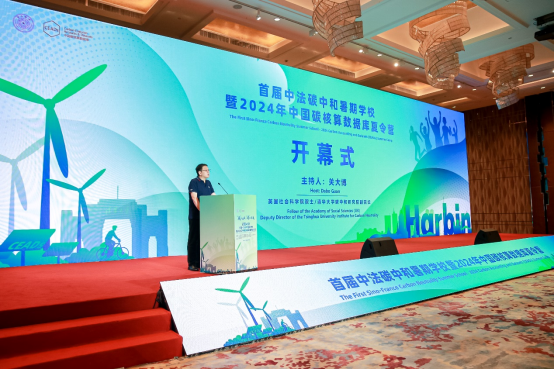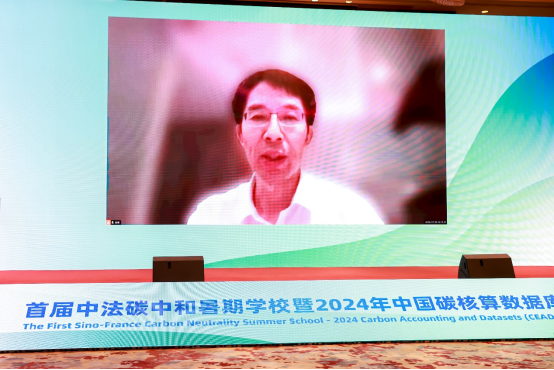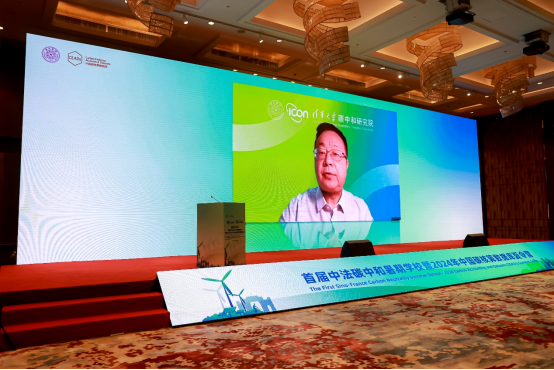On July 25, 2024, the 1st Sino-France Carbon Neutrality Summer School and 2024 Carbon Emission Accounts and Datasets (CEADs) Summer Camp officially launched in Harbin. The Summer Camp welcomed over 160 students, including master’s and doctoral candidates from prestigious universities both domestically and internationally, such as Oxford University, Cambridge University, the University of Chicago, the University of Pennsylvania, Sciences Po Paris, the École des Hautes Études en Sciences Sociales, Tsinghua University, Peking University, and Zhejiang University, as well as outstanding students from various high schools.
The Summer Camp is organized by the Heilongjiang Overseas Friendship Association, the Ministry of Science and Technology’s China 21st Century Agenda Management Center, Tsinghua University, and Harbin Engineering University, with co-organizers including the Harbin Overseas Friendship Association, the Heilongjiang Green Low-Carbon Returnee Entrepreneurship Union, Zhejiang University of Technology, University College London, the University of Birmingham, Tsinghua University’s Institute for Carbon Neutrality (ICON), Tsinghua University’s Department of Earth System Science, and Harbin Normal University Affiliated High School. This year’s Summer Camp focuses on the theme of “Carbon Peak and Carbon Neutrality Theory and Carbon Accounting Theory and Practice,” organizing a training course system led by academicians and experts to provide guidance on theories and practices related to “dual carbon”, and carbon accounting, aiming to cultivate high-level professionals with strong practical abilities in line with the 3060 “dual Carbon” goals.

The opening ceremony was hosted by Professor Guan Dabo, deputy Dean of ICON, Tsinghua University, Chair Professor of Basic Sciences, and Fellow of the British Academy. He introduced the significance of the Summer Camp at this special juncture marking the 60th anniversary of diplomatic relations between China and France, as well as the unique features of the group settings. He then introduced the guests attending the opening ceremony, expressing heartfelt gratitude to all supporting organizations and experts, while also warmly welcoming the participants.
Xu Jianguo, President of the Heilongjiang Overseas Friendship Association; Chen Ming, Deputy Director of the Basic Science Department of the Ministry of Science and Technology; Ke Bing, Deputy Director of the China 21st Century Agenda Management Center; Zhao Yuxin, Vice President of Harbin Engineering University; Gao Xiang, Academician of the Chinese Academy of Engineering and President of Zhejiang University of Technology; Tim Broyd, Fellow of the Royal Academy of Engineering and Director of the Digital Innovation Institute at University College London; and Yan Jinyue, Academician of the European Academy of Sciences and Arts and the Hong Kong Academy of Engineering Sciences, attended the opening ceremony and delivered speeches.

Zeng Rong, Vice President of Tsinghua University, delivered a message to the participants, pointing out that the purpose of establishing the Summer School and Summer Camp is to transform the scientific research advantages of Tsinghua and other universities and research institutions into advantages in talent cultivation, thereby training more innovative and dynamic “dual-carbon” talents for the country. This initiative has received enthusiastic responses from all sectors of society. He also encouraged young people aspiring to engage in the “dual-carbon” field to use this platform to contribute their wisdom and strength in addressing climate change.

He Kebin, Academician of the Chinese Academy of Engineering and Dean of ICON, Tsinghua University, delivered a message, warmly welcoming all guests and participants. He highlighted the significance of the multi-scale carbon accounting inventory and socio-economic and trade database compiled by the CEADs team led by Professor Guan Dabo, which effectively fills data gaps in several emerging economies.
Representatives of outstanding past participants, Yang Chunran, a master’s student at the University of Pennsylvania, and Shui Bin, a doctoral student at City University of Hong Kong, reminisced about their unforgettable experiences at last year’s CEADs Summer Camp. They enthusiastically shared their experiences and sincerely congratulated this year’s participants. They stated, “This ten-day Summer Camp will be a valuable experience in your life.” During this time, everyone will have the opportunity to meet their academic idols and learn and grow together with like-minded new friends. In addition to rich academic training, they will also inspire new thoughts and creativity through exchanges and interactions.
Zhang Li, Executive Dean of the China Electric Power Engineering Consulting Group Co., Ltd. and the China Electric Power Carbon Neutrality Development Research Institute, delivered a speech titled “Developing Green Hydrogen-Based Fuels to Create New Productive Forces,” discussing the strategic significance, industrial practices, and development suggestions, emphasizing the hope that international cooperation based on green hydrogen-based fuels can be achieved through the China-France platform, working together with global peers to strive for the “dual-carbon” goals.
Professor Gao Xiang, Academician of the Chinese Academy of Engineering, President of Zhejiang University of Technology, Director of the Carbon Neutrality Research Institute at Zhejiang University, and Director of the Baima Lake Laboratory, presented the first “Public Forum” for the participants, sharing research on key technologies and engineering applications in the energy and environment fields from the perspective of strengthening technological cooperation and innovation, as well as promoting emission reduction and empowering new productive forces.
In the afternoon, the organizers arranged an ice-breaking activity. During this process, the students gradually got to know each other and became more familiar with one another. Dr. Guan Yuru and Dr. Li Shuping/Tan Chang provided detailed introductions to the specific methods and accounting steps for carbon emissions in Chinese cities and developing countries. Dr. Wang Wenqiang and Dr. Wang Zhenyu also introduced the construction and application of the multi-regional input-output model for emerging economies (EMERGING database). Through these wonderful presentations, the students not only expanded their knowledge but also mastered practical accounting and model-building methods. We look forward to seeing everyone fully utilize this valuable knowledge in their future research and practice to jointly promote green and low-carbon development!
 Latest recommendations
Latest recommendations


